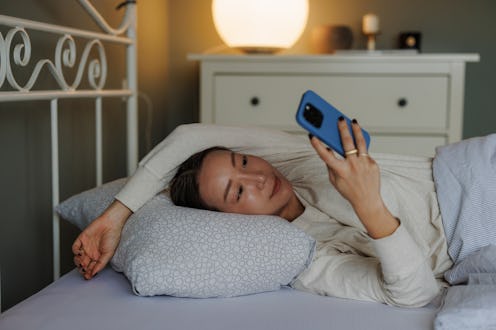Wellness
Finally, Sleep Advice You Won't Hate: It's OK To Use Your Phone In Bed
An expert is officially giving you permission.

Every time you look up a way to get better sleep, it seems like all the hacks have one thing in common: the very annoying “no phone before bed” rule. The advice makes sense — maybe it really is that tempting screen that’s keeping you up — and yet many people say they can’t fall asleep without scrolling.
If you’re one of those people, you’re in luck. According to Dr. Michael Gradisar, the head of sleep science at Sleep Cycle, you shouldn’t feel the need to force yourself to turn off your devices and lie in bed in abject silence. In fact, your phone might even help you drift off to dreamland.
While some experts say blue light from screens disrupts your sleep by suppressing melatonin, Gradisar says this advice is actually based on a study that exposed participants to abnormally intense levels of it. “Over time, it became simplified into a broad recommendation,” he tells Bustle. “It’s one of the most persistent myths in sleep science.”
Last year, he published a study in Sleep Medicine Reviews showing that blue light from everyday devices simply isn’t bright enough to affect your sleep in a meaningful way. “For context, the screens we use at night typically emit light under 80 lux, while significant circadian shifts usually require exposure to light intensities around 500 lux or more,” he says.
Ultimately, getting a good night’s rest is less about ditching your devices and more about how you use them in the hours before you snooze. Here’s what to know.
Phones In Bed? Seriously?
If you want to scroll, play a podcast, or even watch TV before bed, don’t hold back. For many people, enjoying some pre-sleep screen time might even be helpful.
“Using a phone or having background noise from the TV helps quiet the mind, especially if your thoughts tend to spiral when the room goes silent,” Gradisar says. “In sleep science, we often see that the real barrier to falling asleep isn’t the screen or the light, but racing thoughts, worry, or stress.”
Relaxing with your phone goes a long way. “That distraction can actually reduce cognitive arousal, which is a key factor in insomnia,” he says.
While scrolling can quickly become a coping tool, and one that does make it easier to fall asleep, Gradisar recommends investigating the root cause of your sleep issues, whether it’s stress-related or a circadian rhythm issue.
“If you’re lying awake each night and blaming your phone, it might be time to look deeper,” he says. “Phones may be part of your bedtime routine, but they’re rarely the core problem. Instead, it’s often your thoughts, your stress levels, or your internal clock that need attention.”
Along with other researchers, Gradisar conducted a comprehensive review of nearly a dozen experimental studies about whether blue light from screens meaningfully affected sleep. They found that screens aren’t the sleep villain they’re made out to be. What’s really impacting your rest is staying up too late. “It’s a behavioral issue,” he says. “Not a biological one.”
Tips For Lulling Yourself To Sleep
Not all screen time is equal. “Don’t scroll endlessly, stress over emails, or chase one more episode deep into the night,” he says. Instead, browse a soothing subreddit, organize a Pinterest board, or play a simple game, and limit yourself to just one device.
If you can prop up your phone, even better. The less you tap your screen, he says, the more likely you are to relax into sleep.
“Try not to start anything too stimulating close to bedtime, and ideally, aim to protect your sleep window,” he says. “At the end of the day, it’s not about eliminating screens. It’s about being intentional with them.”
Studies referenced:
Bauducco, S., Pillion, M., Bartel, K., Reynolds, C., Kahn, M., & Gradisar, M. (2024). A bidirectional model of sleep and technology use: A theoretical review of how much, for whom, and which mechanisms. Sleep Medicine Reviews. doi.org/10.1016/j.smrv.2024.101933.
Chang, AM. (2015). Evening use of light-emitting eReaders negatively affects sleep, circadian timing, and next-morning alertness. Proc Natl Acad Sci U S A. doi: 10.1073/pnas.1418490112.
Source:
Dr. Michael Gradisar, head of sleep science at Sleep Cycle